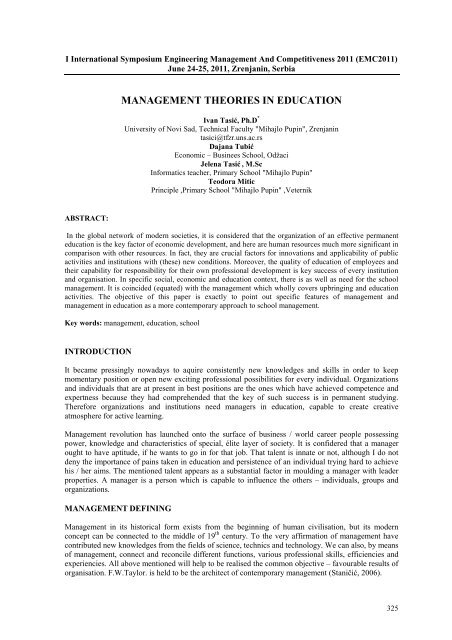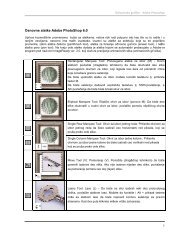MANAGEMENT THEORIES IN EDUCATION - Mihajlo Pupin
MANAGEMENT THEORIES IN EDUCATION - Mihajlo Pupin
MANAGEMENT THEORIES IN EDUCATION - Mihajlo Pupin
Create successful ePaper yourself
Turn your PDF publications into a flip-book with our unique Google optimized e-Paper software.
I International Symposium Engineering Management And Competitiveness 2011 (EMC2011)June 24-25, 2011, Zrenjanin, Serbia<strong>MANAGEMENT</strong> <strong>THEORIES</strong> <strong>IN</strong> <strong>EDUCATION</strong>Ivan Tasić, Ph.D *University of Novi Sad, Technical Faculty "<strong>Mihajlo</strong> <strong>Pupin</strong>", Zrenjanintasici@tfzr.uns.ac.rsDajana TubićEconomic – Businees School, OdžaciJelena Tasić , M.ScInformatics teacher, Primary School "<strong>Mihajlo</strong> <strong>Pupin</strong>"Teodora MiticPrinciple ,Primary School "<strong>Mihajlo</strong> <strong>Pupin</strong>" ,VeternikABSTRACT:In the global network of modern societies, it is considered that the organization of an effective permanenteducation is the key factor of economic development, and here are human resources much more significant incomparison with other resources. In fact, they are crucial factors for innovations and applicability of publicactivities and institutions with (these) new conditions. Moreover, the quality of education of employees andtheir capability for responsibility for their own professional development is key success of every institutionand organisation. In specific social, economic and education context, there is as well as need for the schoolmanagement. It is coincided (equated) with the management which wholly covers upbringing and educationactivities. The objective of this paper is exactly to point out specific features of management andmanagement in education as a more contemporary approach to school management.Key words: management, education, school<strong>IN</strong>TRODUCTIONIt became pressingly nowadays to aquire consistently new knowledges and skills in order to keepmomentary position or open new exciting professional possibilities for every individual. Organizationsand individuals that are at present in best positions are the ones which have achieved competence andexpertness because they had comprehended that the key of such success is in permanent studying.Therefore organizations and institutions need managers in education, capable to create creativeatmosphere for active learning.Management revolution has launched onto the surface of business / world career people possessingpower, knowledge and characteristics of special, élite layer of society. It is confidered that a managerought to have aptitude, if he wants to go in for that job. That talent is innate or not, although I do notdeny the importance of pains taken in education and persistence of an individual trying hard to achievehis / her aims. The mentioned talent appears as a substantial factor in moulding a manager with leaderproperties. A manager is a person which is capable to influence the others – individuals, groups andorganizations.<strong>MANAGEMENT</strong> DEF<strong>IN</strong><strong>IN</strong>GManagement in its historical form exists from the beginning of human civilisation, but its modernconcept can be connected to the middle of 19 th century. To the very affirmation of management havecontributed new knowledges from the fields of science, technics and technology. We can also, by meansof management, connect and reconcile different functions, various professional skills, efficiencies andexperiencies. All above mentioned will help to be realised the common objective – favourable results oforganisation. F.W.Taylor. is held to be the architect of contemporary management (Staničić, 2006).325
apply new knowledges of management in organizations that ought to learn constantly.” (Staničić,2006:20).Strategical management requests inspection of everything at school including as well all activities andwidened hourly rate. Purpose defining is the central aspect of management, and in education (it) isexpected to be focused on learning. Creating selfmanaging schools are opened greater opportunities forleaders, so that they can adopt strategical approach to management. Proactive access in managementrequests considering future during longer period of time with clear vision of future. If management isreactive, it is difficult to accept long – dated prospect. The difference of strategic thinking over from theoperative management can be seen in:1. Focus on long – dated period;2. Creativity, capability of innovation and cancelling of out – of – date praxis;3. Scannig of external background (surrounding);4. Scrutinized accepting from helicopter outlook. (www.ssmb.hr)The educational management appears considerably later than in some other fields of economy. Thecause is first in social position of education. Education as an activity which was not long ago managedin a centralized way in most of countries. The role of managers was to transfer decisions made at thelevel of central state politics. Through decentralization and greater autonomy of decision making greaterresponsibility is passed on to lower levels of decision making. Leaders are asked to decideindependently in interest of school and its pupils, as well to take care of the qualitative realizing of thosedecisions. The importance of good management is stressed. Contemporary concept of goodmanagement emphasizes as first the care for human resources, because manpower potential is a specificfeature which contributes to the quality of the achievement in all fields of human work, as well ineducation. Such kind of development has determined desirable profile of a good manager. He ought tobe more a leader than a manager. So, where is the difference between management and leadership, amanager and a leader respectively? Insisting on the difference between a manager and a leader usuallyis cited that “ a manager maintains systems, relies on control, considers things in short terms, acceptsstatus quo; a leader motivates, gives an incentive and energy, watches things in long ranges and has avision; he challenges and changes status quo. Management is performed on things, leadership onpeople. The function of management is to command and control, and the leadership function explainsthe direction of changes and wins the members of organization over to take part in the process ofchanging. Leading means the existence of an enlightened vision about the fact what an institution isnow, and what it can become, but as well the capability to convince the others to accept that vision.(www.azoo.hr ).The educational management is an important innovation in the 20 th century educational system. Whenschool had only one classroom, it was (being) led by a teacher. Meanwhile in schools with manyclassrooms in industrial developed towns and consolidated rural districts, there was necessary workcoordination. Thus, then appeared the need for a specialist with full working time – a managerresponsible for financial, educational, human and physical school potential (Staničić, 2006:20).Staničić writes that “management mostly is connected to the phenomena of organized life as planning,analyzing, organizing, financing, supervision and similarly, while leading is connected to people, theirbehaviour, work style, communicating, motivating and the like ” (www.azoo.hr).School management occurs in a specific social, economical and educational context. Because ofeconomic competition, demands on schools become from day to day more strict and greater.Governments press and give in control over curriculum and its valuation and inspection supervision.They centralize and decentralize educational system, and give as well school wider control overresources, include budget as well, management of teachers, all this within competition amonginstitutions which are described as “quasi - market“ (www.ssmb.hr).MODELS OF <strong>MANAGEMENT</strong> <strong>IN</strong> <strong>EDUCATION</strong>Modern authors most often connect themselves on Cuthbert’s, Bolman’s and Deal’s as well Margan’sapproaches to the theories of educational management and guidance. Cuthbert (1984.) resumes modelsinto five groups: analytically rational, pragmatically rational, political as well the models that point outbilingualism and phenomenal and interaction models. As criteria for design, he takes the levels ofdialogue among employcees about their objectives, the manners that value efficiency and concepts ofstructure of their institution / organization. Bolman and Deal give four aspects or scopes: structural,327
political, symbolical and human resource. Morgan (1997.) offers metaphors for organizations. He namesthem as: mechanical, organic, contemplative, cultural, political and the like. The integration of theirviews has realized an English theoretician of management and guidance in education, Tony Bush in hiswell – known study Theories of Educational Leadership and Management (2003.). In his distinction oftheories and models, the author starts from the objective, structure, background and guidance in culturalorganizations. The models preferred in some institutions differ in insisting on the importance oforganizational objectives, against the individual objectives of employees. The emphasis on structurewithin educational organizations indicates comprehension and acceptance of individuals through theirroles. The relation between an institution and its environment is recognized through intensity andquality of collaboration. Organizations differentiate as well according to strategies of guidance. Buchhas established a classification of six models of management in the institutions of upbringing andeducation: formal, friendly (cooperative), political, subjective, bilingual and culture (ones). Heconnected these models together with adequate guidance models. These are models of management,participation, transformation, transaction, contingency, instruction, as well as postmodern, moral andinterpersonal models. The models of educational management and guidance are diverse conceptualaccesses. Each of them almost never „cover“ reality of some educational practical experiences, so incertain situations one can recognize many of them – in different percentage. Proportion of some modelsin educational institutions depends on their magnitude, organizational structure, the time that can begiven to management, ability of resources procuring and institution background (www.azoo.hr).CONCLUSIONEducation is one of substantial factors of efficiency and speed of economical development. Itpresents social value for itself, because operations improvement and changing of social relationsdepend at the most of people’s knowledge and education. Schooling qualifies a person to be anactive agent of economical changes. The management of the organizations of economical type issimilar as the management in school system.The management function is assigned to managers, leaders respectively. Leaders and managerswith their management, guidance and planning ought to create positive working climate, so that theparticipants in school system would take pains and as well invest more greater endeavour in it.People like to be motivated and led, and, of course, they dislike to be controlled and frightened bysticky forms of management.In spite of some critics' opinion that management can not be applied in the field of school system,there are very certain opportunities for it if general observing of goverment participation in schoolmanaging changes. Pedagogical – educational institutions have to become more independent in theprocess of decision making cannected to management of their systems, because they know it at thebest.Because of these purposes, it is necessary to develop managerial cadre specialized for schoolmanagement as a peculiar system and to invest in it. It has not be forgotten that from oureducational scheme quality depends also our future, as well the future of the following generations.REFERENCES:Andevski, M., Arsenijević,J. (2010), Educational management for a learning society,.Novi Sad:Faculty ofPhilosophyLalović, R. (2010), Administering, management and guidance in school. Available on: www.ssmb.hrSajfert, Z. (2002), Business organization. Zrenjanin: Technical FacultyStaničić, S (2006), Management in education. Rijeka: University libraryStaničić,S (2007), Modern trends in school management. Available on: www.azoo.hr328
















